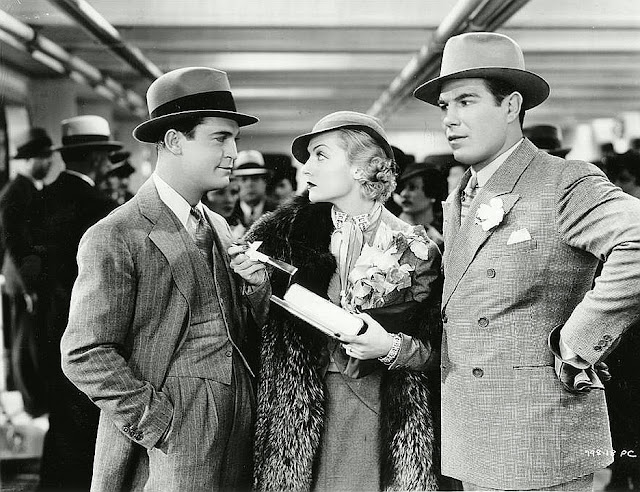"I want to sin and suffer. But right now I only suffer." - Glory
Miss Glory Eden (Ginger Rogers), aka The Purity Girl, is a radio sensation. Ipswich (Gregory Ratoff), the owner of the Ippsie Wippsie Wash Cloth Company, which runs their own sponsored radio station, is desperate to lock down Glory with a brand new contract. But Glory has other ideas. As the baby-voiced model of purity and innocence, the management team tightly controls her public image. Herbert (Franklin Pangborn) is in charge of Glory's wardrobe and diet and Ipswich's cohorts including his right-hand men Speed (Frank McHugh) and Winston (Frank Darien) do his bidding to protect their collective property. Glory is jealous of her maid Vera (Theresa Harris) who has a boyfriend and goes out dancing at night clubs in Harlem. Glory wants to live life on her terms! Complicating matters is Ipswich's rival the Kelsey Dish Rag Co. who wants to steal Glory away from them and sends agent O'Connor (Allen Jenkins) off to sabotage Ipswich's plans. So the Ippsie Wippsie crew comes up with a plan. They want to get Glory a beau. They zero in on Jim (Norman Foster), a simple country man from Kentucky who was plucked out of a batch of prospective fan letters. They bring him to New York City and thus starts the media circus of publicity stunts that journalists, including the clueless Elmerada (Zasu Pitts) and mid-mannered Stu (Sterling Holloway), just lap up. No one stops to think what Glory really wants... except for Jim. Will Glory find true happiness in the midst of all of this chaos?
Professional Sweetheart (1933) was directed by William A. Seiter for RKO. The story was written by Maurine Dallas Watkins, best known for her stage play Chicago. This Ginger Rogers' first film for RKO and later that year she signed her own contract with them. Norman Foster was loaned out from Fox to play the leading man.
The biggest draw for me to this film was the cast. There were so many of my favorites crammed into one 79 minute movie: Ginger Rogers, Theresa Harris, Frank McHugh, Allen Jenkins, Zasu Pitts and Sterling Holloway. Wow! My perennial favorite Akim Tamiroff has a small role as the hotel waiter who takes Frank Pangborn's elaborate food order.
Speaking of food, I love to see how it's represented in early films. I was delighted with one scene in particular when characters discuss what they'd like to order from the hotel room service.
What Glory (Ginger Rogers) wants to order: caviar, lobster in wine, avocado salad, champagne, fruit salad with whipped cream, nuts and maraschino cherries
What Herbert (Franklin Pangborn) orders for Glory: breast of young chicken on whole wheat toast with no mayonnaise, unsalted butter, baked apples with cream (certified not pasteurized), cocoa (not chocolate).
What Herbert (Franklin Pangborn) orders for himself: caviar, Lobster Thermidor, avocado salad, fruit salad with whipped cream, nuts and maraschino cherries, chocolate ice cream, hot fudge sauce and marshmallow cake.
What Speed (Frank McHugh) orders for Elmerada (Zasu Pitts) to delay her: Baked Alaska (because it takes 20 minutes to make.)
"You don't kiss like you look." - Glory
Professional Sweetheart warns viewers of the dangers of treating humans like commodities although it wraps up nicely in the end. Glory as a character can be insufferable with her spoiled behavior and tantrums. She wasn't winning any points from me with her blatant distaste for books. But you can't help sympathize with her. She just wants her personal freedom. That's something everyone deserves.
The film spices things up by featuring Ginger Rogers in various states of undress giving it some Pre-Code flavor. Allen Jenkins is probably the most suave I've ever seen him in a film role. As O'Connor he uses his knowledge of romantic relationships, women ("I know dames backwards.") and business to manipulate the different characters.
Unfortunately the racism in this film is quite palpable. The management team clearly wants to appeal to a conservative white audience ("It doesn't look good to the corn belt."). When they search for Glory's prospective beau they make it clear that he has to be as white and pure as possible. Especially after Glory has expressed her desire to visit Harlem. Frank McHugh's Speed travels to "Home of the Purest Anglo-Saxons" to find Jim (Norman Foster).
Professional Sweetheart (1933) is available on DVD-MOD from the Warner Archive Collection and can be purchased at the WB Shop. When you use my buy links you help support this site. Thank you!
This is the film's DVD debut. George, D.W. and Matt of the Warner Archive Podcast discuss this film in the January episode Jungle Kings, Giants and Jokers.
Warner Archive Wednesday - On (random) Wednesdays, I feature titles from the Warner Archive Collection. Thank you to Warner Archive for sending me copy of Professional Sweetheart (1933).









































